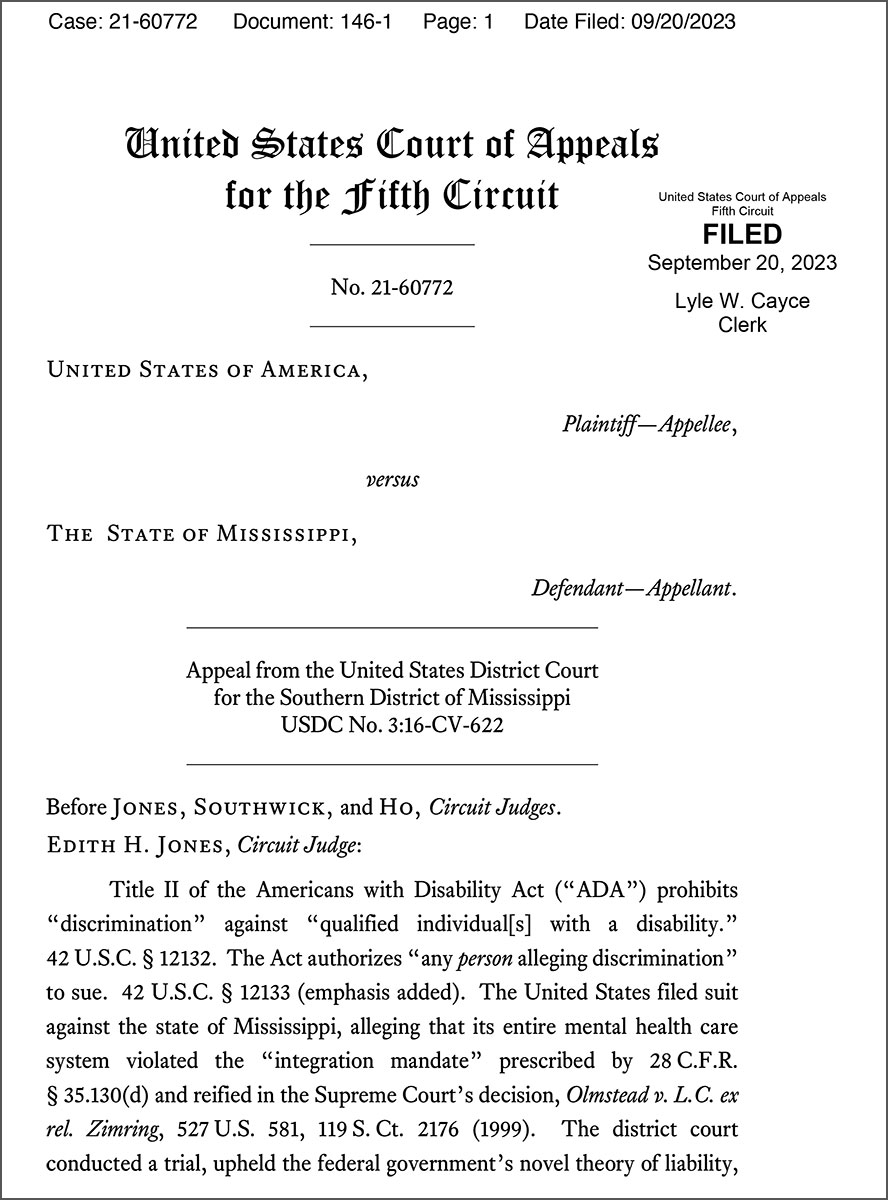Mississippi does not discriminate against people with mental illness by failing to provide community care and over-relying on institutionalization, the 5th U.S. Circuit Court of Appeals in New Orleans said in a ruling on Wednesday.
The decision reverses a ruling U.S. District Court Judge for the Southern District of Mississippi Carlton W. Reeves issued in 2019, which required the State to make changes to ensure people with mental illnesses have the same protections as other people covered under the Americans With Disabilities Act.
“On paper, Mississippi has a mental health system with an array of appropriate community-based services. In practice, however, the mental health system is hospital-centered and has major gaps in its community care,” the judge wrote in 2019. “The result is a system that excludes adults with SMI from full integration into the communities in which they live and work, in violation of the Americans with Disabilities Act (ADA).”
But a three-judge panel on the 5th Circuit, widely considered the most conservative federal appeals court in the country, reversed the 2019 order, calling it a “novel plan of reconstruction that fails on many levels.” Republican presidents appointed all three judges.
“People with serious mental illness are unfortunately, they’re virtually always at risk of institutionalization. That’s the nature of this very challenging illness,” Mississippi Solicitor General Scott Stewart said during oral argument in the case on Oct. 5, 2022.

But mental health advocates have long argued that focusing on traditional therapy and institutionalization instead of care that helps people learn to manage their illness and perform day-to-day functions violates the rights of Mississippi residents with mental ilness.
“Mental-health services should be set up to help them do those things, like help them learn how to work and manage their mental illness at the same time,” Families as Allies Director Joy Hogge told this reporter in 2019. “And that also means if that’s really happening, we shouldn’t rely on state hospitals so much.”
Starting in February 2011, the U.S. Department of Justice began an investigation into Mississippi’s mental health system; in December 2011, the federal government notified the State that it was “unnecessarily institutionalizing persons with mental illness” in violation of the ADA and outlined steps to come into compliance. The Justice Department filed a lawsuit against the State in August 2016.
In their ruling Wednesday, the 5th Circuit panel took issue with the fact that the Justice Department did not sue based on any individual instances of discrimination. “Rather, the federal government charged that due to systemic deficiencies in the state’s operation of mental health programs, every person in Mississippi suffering from a serious mental illness was at risk of improper institutionalization in violation of Title II,” the opinion said.
The judges who ruled in the case include Judge Leslie H. Southwick, appointed by Repubican President George W. Bush; Judge Edith Jones, appointed by Repubican President Ronald Reagan; and Judge James C. Ho, appointed by Republican President Donald Trump.
Mississippi Attorney General Lynn Fitch, a Republican, celebrated the ruling in a statement late Wednesday afternoon.
“We are pleased that the Fifth Circuit Court of Appeals has reversed the lower court’s ruling that gave the federal government the ability to dictate the way Mississippi provides mental healthcare to its citizens,” she said. “… For too long, federal agencies have used the threat of legal action based on ‘novel theor[ies] of liability,’ like those that started this case, to coerce Mississippi and other states into adopting their preferred policies and budget priorities. This opinion is a good reminder to Washington that the people have the right to speak through their state elected leaders to set their own priorities.”
The Justice Department could still appeal the decision en banc, meaning to the entire 5th Circuit’s slate of 17 judges, or to the U.S. Supreme Court. The U.S. government’s argument rests on the high court’s 1999 ruling in Olmstead v. L.C., which found that states must ensure people with mental illnesses receive the same protections as other disabled people covered under the ADA.










